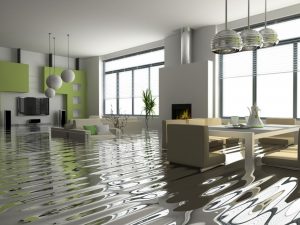Although the flooding season is typically in the spring, it is always good to be prepared for a potential flood in your home. Floods can leave a lot of your household items damaged, destroyed, and unusable. On top of damaging your items, floods can be very dangerous if the proper precautions and procedures are not followed. If your home floods be sure to follow these guidelines to keep you, your family, and your property safe.
Turn off the electricity. Before going into your home and getting into any of the water, make sure you turn off all electricity at the fuse box. Having the electricity on is a major hazard and will create more danger when you decide to go back into your home. If your fuse box is not in a place that can be safely reached, do not stand in the water to get to the fuse box or to turn off the electricity. If this is the case, call your local fire department so that they can come and safely turn off your electricity.

Pump out water gradually. When you begin to pump the water out of your home, it is very important that you do not pump it out too quickly. The reason for this is it could end up causing more damage than there already is; the pressure from the heavy and wet soil outside may damage your basement walls. According to the Red Cross, you should pump out about ⅓ of the water each day; never all at the same time.
Check for contamination. Checking for contamination of food and water is one thing that some people may overlook, especially when it comes to the contamination of food. Any food that comes into contact with the flood water should be thrown away. Even if you have a garden and it came into contact with flood water, it should be thrown away. A lot of the time, flood water is contaminated with sewage. The same thing goes with checking your drinking water, whether you drink tap water or well water. Make sure your water is safe before you drink it. This may mean you will have to get your water purified.
Disinfect and dry out. After you gradually get the water pumped out of your home, you will want to disinfect and dry everything out. The best way to disinfect your home is to wash the floors and walls with a bleach and water solution. You can also use this solution to disinfect any items that came into contact with the flood water. If any furniture or carpet was affected, you will need to throw it away or have it cleaned by a professional. To dry out your home, use air conditioners, fans, and dehumidifiers.
Document any damage. Make sure you take photos of any areas of your house that were damaged or any of your belongings that were damaged. It’s important to do this as soon as you can so that the documentation is even more accurate for insurance claims.
If your home floods, be sure to take extra care when cleaning out your home and ensuring it is completely safe before letting your family in the affected areas.


